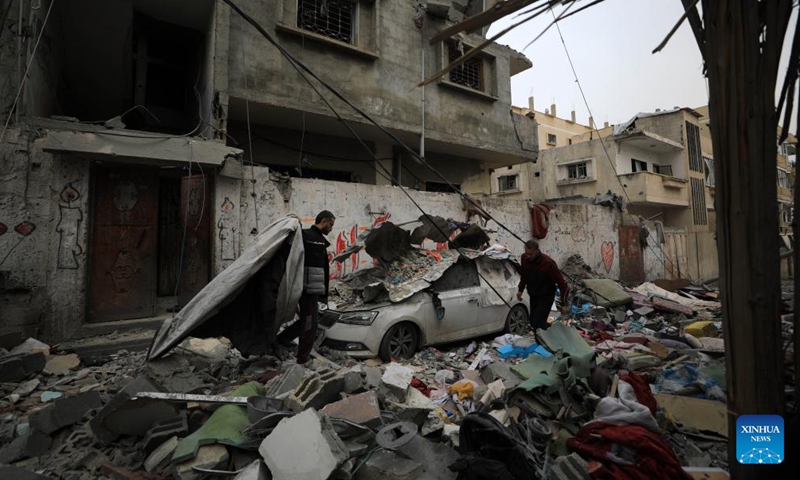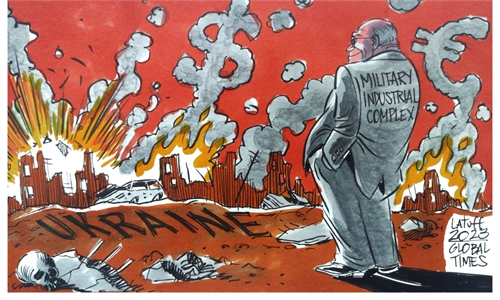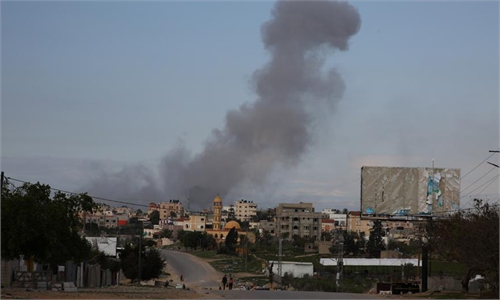55% of Chinese respondents say US irresponsible in handling of Palestinian-Israeli conflict: GT survey
More than 60% of Egyptian, Saudi respondents applaud China's peace efforts

People are seen among the rubble after an Israeli airstrike in the southern Gaza Strip city of Rafah, on February 27, 2024. The Palestinian death toll in the Gaza Strip has risen to 29,878 since October 7, 2023, the Hamas-run Health Ministry said in a press statement on Tuesday. Photo: Xinhua
A recently published survey conducted by the Global Times Institute at the end of 2023 showed that about 55 percent of Chinese respondents believed the US was being "irresponsible" in handling the ongoing Palestinian-Israeli conflict in Gaza, which has already killed about 30,000 people. About 42 percent of global respondents said the US is unable to properly handle the Gaza and Ukraine crises at the same time.
The survey, conducted between November and December of 2023, received nearly 17,000 responses from adults of 20 countries across the world including China, US, Russia, France, UK, Germany, Japan, India, Saudi Arabia, Turkey, Egypt, Kenya and Brazil.
Chinese analysts said that the results of the survey showed that Chinese people shared the same feeling as people around the world, as the US is now facing increasing criticism, protests and pressure domestically and internationally due to its poor handling of the Gaza crisis, failing to stop the humanitarian crisis and instead vetoing resolutions for a cease-fire time and again at the UN Security Council.
Aaron Bushnell, 25, a US Air Force airman who set himself on fire outside the Israeli Embassy in Washington in an apparent act of protest against the war in Gaza, has died, the military and local police said on Monday. This is the latest proof that the US approach to the ongoing crisis is extremely problematic and is becoming increasingly unpopular among its own people, said experts.
According to data released by the United Nations Office for the Coordination of Humanitarian Affairs, as of Wednesday, more than 30,000 people (29,782 Palestinian and more than 1,200 Israeli) have been killed since October 7, 2023, with more than 70,000 injured and 1.7 million displaced in Gaza.
The Palestinian-Israeli conflict is a humanitarian disaster that no one wants to see. The survey results show that China stands with the majority of people in the world, wishing for an early and peaceful resolution to the conflict, Niu Xinchun, executive director of the China-Arab Research Institute of Ningxia University, told the Global Times on Sunday.
Li Haidong, a professor with the China Foreign Affairs University, told the Global Times on Sunday that if the Gaza conflict does not end quickly, its spreading effect will become increasingly obvious, primarily affecting neighboring countries and the entire Middle East. The ongoing conflict is exacerbating existing crises and contradictions, leading to a further deterioration of the situation.
This situation could halt the reconciliation process between Israel and Saudi Arabia, accelerate the peace process between Saudi Arabia and Iran, and unite the Arab and Islamic worlds against Israel, thereby complicating the regional dynamics further, Li noted.
Irresponsible Washington
Currently, although US President Joe Biden expressed optimism that a hostage-for-cease-fire deal in Gaza could be reached by the end of this week, officials from Israel, Hamas and Qatar are being cautious, suggesting that differences remain as negotiators work to secure an agreement, CNN reported on Tuesday.
The Global Times survey showed that 55 percent of Chinese respondents believe the US' performance in the Palestinian-Israeli conflict is "irresponsible," while only 7 percent of the Chinese respondents consider the US is being "responsible." Meanwhile, 42 percent of them view the role played by the US as "unethical," 39 percent find it "unjust" and 36 percent believe the US "has hindered the resolution of the conflict."
Li said that the US' irresponsibility in the conflict includes inconsistent actions and rhetoric, offering continuous military support to Israel despite advocating for a cease-fire, and exacerbating regional conflicts, especially with relation to Iran.
The US also engages in military actions in the Middle East, demonstrating a reliance on military force, which also adds to the regional instability. These actions highlight the disconnection between the US' stated objectives and its actual practices.
By one-sidedly supporting Israel and prioritizing its own political aims over humanitarianism, the US' stance is going against the global consensus, Niu pointed out.
This kind of support that allows Israeli forces to kill tens of thousands of Palestinian civilians has tarnished the US' international image and also sown discord within the US government, experts noted.
Moreover, about 48 percent of Chinese respondents believe the US cannot handle both the Russia-Ukraine and Palestinian-Israeli conflicts simultaneously. In Russia, 64 percent of respondents think the US cannot handle the two crises at the same time. According to the survey, on average, about 42 percent of the global respondents don't believe that Washington is able to handle the two crises properly.
Li criticizes the US strategy of engaging in multiple conflicts simultaneously as "foolish, often leading to failure." Li argues that US political elites hold "an inherent, delusional, arrogant, and prejudiced selfishness regarding America's capability to engage in conflicts," leading to the destructive use of resources and the exacerbation of conflicts.
The US behavior in handling international affairs is often criticized for creating conflict and turmoil rather than fostering peace, prosperity, and stability, Li emphasized, noting that the actual actions of the US have had a negative impact in the Middle East and globally, a practice that is unpopular within the international community.
China's mediation role
According to the global survey, in the majority of Western countries, including Australia, US, UK, France, Germany, and in three African countries, at least 30 percent of the respondents believe the conflict will expand into a larger Middle East war, with Indonesia registering the highest number of responses in the affirmative at 44 percent, and Turkey, Kenya, and South Africa following close behind at 40 percent.
To alleviate the humanitarian crisis in Gaza and achieve a cease-fire as soon as possible, China has actively engaged and will continue to engage in mediation along with the United Nations and the international community, aiming to de-escalate regional conflicts.
It was under China's presidency that Resolution 2712, the first resolution since this round of the Palestinian-Israeli conflict broke out on October 7, 2023, was adopted by the UN Security Council on November 15. It was also the first UNSC resolution on the Palestinian-Israeli issue since the end of 2016.
According to the Global Times survey, more than 60 percent of the respondents in Saudi Arabia and Egypt affirm that China's mediation efforts are contributing to resolving the Palestinian issue.
The survey data show that over half (54 percent) of the respondents from Saudi Arabia, Egypt, Russia, and the US affirmed China's positive role in mediation, 23 percent thought it had little effect (including "not very useful" and "completely useless"), and another 23 percent found the question difficult to answer.
According to Li, survey results indicate majority support in both the US and other countries for China's mediation in the Palestinian-Israeli conflict, reflecting China's position on the side of international justice.




